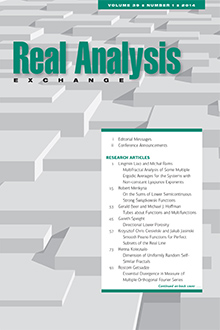Abstract
Let $m\geq 2$ be a natural number. Let $\nu _\lambda^{m} $ be the distribution of the random sum $\sum\limits_{n=0}^{\infty } \theta_n\lambda ^n$, where $\theta _n$ are i.i.d. and for every $n$ the random variable $\theta _n$ takes value in the set $\{0,\ldots,m-1\}$ with equal probabilities. As a generalization of Solomyak Theorem we prove that for Lebesgue a.e. $\lambda \in\left(1/m,1\right)$ the measure $\nu _\lambda^{m} $ is absolute continuous w.r.t. the Lebesgue measure. (For smaller $\lambda $, the measure $\nu _\lambda^{m}$ is supported by a Cantor-set, so if $\lambda\lt 1/m$ then $\nu _\lambda^{m}$ is singular.)
Citation
Károly Simon.
Hajnal R. Tóth.
"The absolute continuity of the distribution of random sums
with digits {0, 1, … ,
Information





